 |
|
 10-11-2011, 10:50 AM
10-11-2011, 10:50 AM
|
#1
|
|
Lieutenant
Join Date: Oct 2011
Posts: 51
|

Hi,
This is my first post to this forum and I want to start a discussion of Bernard Moitessier heritage as applied to today's world. I am reading his books and fascinated with the great character and the great sailor that he was:
http://en.wikipedia....nard_Moitessier
There are many interesting things to discuss regarding this man, his voyages and boats...
Yet I start with Bernard's unique 39 foot steel ketch Joshua that he sailed 1.5 times around the world in 1968. I hope somebody can help me understand her steering system. In his famous book "Long Way" Bernard several times describes how he steers the boat from inside:
p.50.
"I go on deck ... and quickly duck below again, soaked by a blast of spray. The aft cabin portholes are intact, a sight that warms my heart. I fill the sails again, steering with inside steering wheel..."
p.51.
"From time to time I stood up on the seat to take a few deep breaths and get a better feel of the conditions. During the quiet periods I went out in the cockpit, but without letting go of the hatch cover handle, ready to dive below"
...
"I went below to suck on a can of condensed milk and roll myself a cigarette. Then I regained my perch, again watching the sea through the closed turret"
So my questions:
1) How Joshua inside steering post and "turret" look like? It is not so obvious from 360 degree picture of Joshua:
http://www.360cities...pit-la-rochelle
2) According to pictures Joshua has a trunk cabin and does not have a pilot house. Yet Bernard could very well steer the boat from inside observing the seas from portholes only. How can this be sufficient for a good observation?
3) Any links to relatively modern cruising boats with similar inside steering?
I am very much interested in todays boats with similar seaworthiness and complete inside steering ability as pioneered by Bernard's Joshua. Would appreciate any pointers here.
Thanks!
Dmitri
__________________
|

|

|
 10-12-2011, 01:58 AM
10-12-2011, 01:58 AM
|
#2
|
|
Admiral
Join Date: Oct 2004
Posts: 3,067
|

Welcome Dmitri,
Thanks very for your interesting introduction to one of the greatest sailors of our time.
I too could find no sign of steering in the forward saloon, the 360 showed clearly the forward part of the raised saloon - with its viewing circular storm port - but no steering below that.
Maybe the clue lies in his " "I go on deck ... and quickly duck below again, soaked by a blast of spray. The aft cabin portholes are intact, a sight that warms my heart. I fill the sails again, steering with inside steering wheel..."
If correct then the additional helm in the aft cabin could easily be connected to the helm in the steering station on deck.
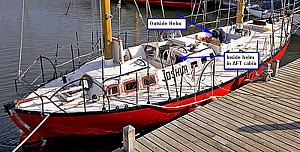
The most common inside steering helms are those found in Pilot House designs. It is easier to connect the 2 systems when they are at a similar level.
Here are some images showing typical types :-

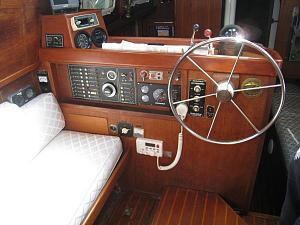
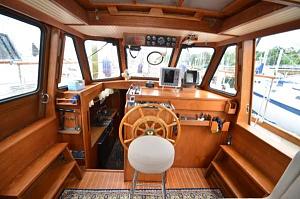
Dmitri. here are two excellent You-Tube videos (part 1 & part 2) On Joshua and Bernard
Moitessier - narrated in French by Patrick Schnepp - Directeur, Musee Maritime de la Rochelle
CLICK 1
CLICK 2
Another YOU Tube is this one many parts filmed and narrated by Bernard :-
CLICK 3
If you look again at the videos, other clues give different answers - Check
Hope your French is better than mine !!
Regards
Richard
__________________
__________________

|

|

|
 10-12-2011, 06:52 AM
10-12-2011, 06:52 AM
|
#3
|
|
Moderator/Wiki Sysop
Join Date: Apr 2008
Home Port: Samos
Vessel Name: S/Y Thetis
Posts: 559
|
Dmitri
A friend of mine Nikos Vartzikos, alas no longer with us, owned a Joshua with which he crossed the Atlantic singlehanded. He also cruised the Black Sea and Greenland. I do remember the boat's interior and her steering system under the "bubble".
He wrote a book about his crossing but it is in Greek. I have the book at home but I am now on my boat. When I return at the end of the month I will look in the book and try to answer some of your insightful comments.
Regards fro the Aegean
Vasilis
 : Mediterranean, Black Sea, Atlantic |

|

|
 10-12-2011, 12:19 PM
10-12-2011, 12:19 PM
|
#4
|
|
Lieutenant
Join Date: Oct 2011
Posts: 51
|

Thanks for your feedback!
Quote:
Originally Posted by MMNETSEA

Maybe the clue lies in his ""I go on deck ... and quickly duck below again, soaked by a blast of spray. The aft cabin portholes are intact, a sight that warms my heart. I fill the sails again, steering with inside steering wheel..."
If correct then the additional helm in the aft cabin could easily be connected to the helm in the steering station on deck.
|
Agree. I also think that outside helm is directly connected to the inside one with a simple system of steel wires.
Thanks Richard, very clear and informative pictures!
Yes, it may make sense not only to examine the video but also address the questions about Bernard boats construction to Musee Maritime de la Rochelle in France. I am also looking for plans of Joshua and Tamata (the last of Bernard's boats) without any success so far. I think I can do this research as I speak some French (my grand grand father was a French poet  In case I find something about Bernard's boats - I will post here.
Quote:
Originally Posted by Istioploos

A friend of mine Nikos Vartzikos, alas no longer with us, owned a Joshua with which he crossed the Atlantic singlehanded. He also cruised the Black Sea and Greenland. I do remember the boat's interior and her steering system under the "bubble".He wrote a book about his crossing but it is in Greek. I have the book at home but I am now on my boat. When I return at the end of the month I will look in the book and try to answer some of your insightful comments.
|
That would very interesting! I'll be waiting for what you will manage to find, thanks!
I am very interested in a modern boat construction which allows to stay on board for many weeks without landfall. Sometimes you simply need to talk to porpoises, you know  I am not talking about high-tech Vendee Globe-kind-of-a-boat here. I am looking for a reliable, not super expensive, not very old (up to 15 years), a used cruiser boat that :
1) Has enough living space and a capacity to carry enough supplies including spare parts, etc. to go for weeks and months without a landfall for a crew of 1-2 (and a dog! 
2) Will not fall apart under the blows of huge breaking waves in case they happen on her path.
3) Has a split rig that allows shorten-handed crew easily reduce sails in no time and with minimum effort possible, such as ketch and cutter rigs do. Joshua was a steel ketch and in 99% of cases was caring all her sails trimmed to the current weather accordingly, thus ensuring optimal canvas size for all possible wind / wave combinations. This in turn provides for maximum speed possible which is very important for running away from strong gales and dangerous shores. To my mind, accomplishing the same with Bermudian sloop rig requires much more effort if at all possible in all cases.
4) Has a reliable windvane - absolutely necessary device for long-distance passages.
5) Also has an efficient steering system in a strong pilot house that won't be blown away by the same breaking waves or in capsize.
Where one can find such a boat today?
Dmitri
__________________
|

|

|
 10-12-2011, 01:59 PM
10-12-2011, 01:59 PM
|
#5
|
|
Lieutenant
Join Date: Oct 2011
Posts: 51
|
Which boat (vendor) would Bernard Moitessier chose today for round the world trip? 
__________________
|

|

|
 10-13-2011, 02:09 AM
10-13-2011, 02:09 AM
|
#6
|
|
Admiral
Join Date: Oct 2004
Posts: 3,067
|
Quote:
Originally Posted by dokondr

Which boat (vendor) would Bernard Moitessier chose today for round the world trip?  |
I believe he would move to the next genration of Josua's - Retaining Steel, Ketch,centre cockpit, Off-shore proven, more space aft, Away from the "Colin Archer Double End Design"
Here is an example of one I have sailed many miles in -
A boat designed and built in the Nederlands - probably the country with the best Steel boat pedigree.
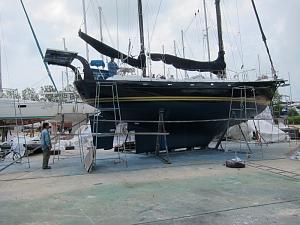
Back in the water a few days ago
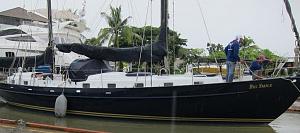
__________________

|

|

|
 10-13-2011, 12:10 PM
10-13-2011, 12:10 PM
|
#7
|
|
Lieutenant
Join Date: Oct 2011
Posts: 51
|

Quote:
Originally Posted by MMNETSEA

I believe he would move to the next genration of Josua's - Retaining Steel, Ketch,centre cockpit, Off-shore proven, more space aft, Away from the "Colin Archer Double End Design"
Here is an example of one I have sailed many miles in -A boat designed and built in the Nederlands - probably the country with the best Steel boat pedigree.
|
Thanks! "Big Smile" takes my breath away - a beautiful boat!
Bernard Moitessier in his "Sea Wagabond's World" gives pictures of both Joshua and Tamata boats and comments on them. Tamata is his last boat - steel 33' cutter . I don't have the exact quote nearby, yet Bernard writes that in 1988 (20 years after his famous circumnavigation) he would prefer Tamata to Joshua, as more easily maintainable and quite sufficient for his circumnavigation needs. Tamata was not as fast sailor as Joshua, he writes, but still a good one.
For me too, Joshua and Big Smile are somewhat big - I need to be able to sail single-handed quite often. I decided to stay in 34 - 36 feet range - enough for 2 and manageable by 1 as well. Also ketch rig - though great split rig to adjust sails quickly and with reasonable amount of effort - yet does not allow to go close to the wind, when beating up. Cutter, both Bermudian and Gaff is a little better in this respect, according to what they write in books. I never sailed nor Ketch nor Cutter rigs, only Bermudian Sloop on various boats up to 43' and small catamarans.
It would be great if somebody could give me more insight on using ketch and cutter rigs on boats up to 36 feet:
1) Does it make sense to use a ketch rig on small boats like that (34 - 36')?
2) Upwind performance, is it really that bad?
3) How really hard is it to use these rigs for a single-handler compared to Bermudian Sloop? Bernard sailed Joshua ketch as natural as one breathe, yet he was an exceptional sailor. I have a great urge to learn both ketch and cutter rigs and not to be afraid to miss the right moment to take a riff on the main of Bermudian sloop any more!
4) Where to look for 'modern' boats with these rigs in 34 - 36' size, as strong as Bernard's Joshua ?
5) As an option, I am thinking about finding a builder for:
Doudley Dix, Hout Bay 33
http://www.dixdesign.com/hb33.htm
Yet I have the following main doubts about this project:
I) No pilot house - no inside steering
II) "Construction is frameless, using longitudinal stringers to support the 3mm hull and deck plating. The stringers are in turn supported by welded on tabs bolted to 13mm plywood bulkheads and semi-bulkheads." --- Not sure that bolting to plywood makes a _strong_ joint.
Any ideas about Hout Bay 33?
Thanks!
__________________
|

|

|
 10-13-2011, 08:20 PM
10-13-2011, 08:20 PM
|
#8
|
|
Admiral
Join Date: Oct 2004
Posts: 3,067
|
Dmitri,
here's a link to a listing of boat builders
http://www.boat-links.com/linklists/...nk-04.html#top
Also Google "Brent Swain steel boat designer"
Not fond of Dudley Dix's designs - not for real weather.Here is a builder of Dix's steel boats :- CLICK
If you have time search for steel and aluminium boats in the Nederlands
they build for the North sea
richard
Richard
__________________

|

|

|
 10-13-2011, 09:11 PM
10-13-2011, 09:11 PM
|
#9
|
|
Lieutenant
Join Date: Oct 2011
Posts: 51
|
Richard, thanks for your help!
__________________
|

|

|
 10-14-2011, 03:19 AM
10-14-2011, 03:19 AM
|
#10
|
|
Admiral
Join Date: Oct 2004
Posts: 3,067
|

Quote:
Originally Posted by dokondr

- I need to be able to sail single-handed quite often. I decided to stay in 34 - 36 feet range - enough for 2 and manageable by 1 as well. Also ketch rig - though great split rig to adjust sails quickly and with reasonable amount of effort - yet does not allow to go close to the wind, when beating up. Cutter, both Bermudian and Gaff is a little better in this respect, according to what they write in books. I never sailed nor Ketch nor Cutter rigs, only Bermudian Sloop on various boats up to 43' and small catamarans.
It would be great if somebody could give me more insight on using ketch and cutter rigs on boats up to 36 feet:
Depends where the skipper wants to go, if specifically into the high latitudes - then the ability to downsize quickly is a good reason.
1) Does it make sense to use a ketch rig on small boats like that (34 - 36')?
only if the plan is to sail in the southern ocean.
2) Upwind performance, is it really that bad? Not at all, it does take a little more trimming, and when the ketch also has an inner foresail, the extra drive can assist in powering the main.
3) How really hard is it to use these rigs for a single-handler compared to Bermudian Sloop? Not at all difficult if one goes out for a few times with an experienced sailor, and then practices and practices.
Bernard sailed Joshua ketch as natural as one breathe, yet he was an exceptional sailor. I have a great urge to learn both ketch and cutter rigs and not to be afraid to miss the right moment to take a riff on the main of Bermudian sloop any more!
Thanks!
|
__________________

|

|

|
 10-14-2011, 09:13 AM
10-14-2011, 09:13 AM
|
#11
|
|
Lieutenant
Join Date: Oct 2011
Posts: 51
|
How about ketch mizzen shadowing the main when reaching or running?
__________________
|

|

|
 10-15-2011, 12:31 AM
10-15-2011, 12:31 AM
|
#12
|
|
Admiral
Join Date: Oct 2004
Posts: 3,067
|
Quote:
Originally Posted by dokondr

How about ketch mizzen shadowing the main when reaching or running?
|
Dimtri
Generally the mizzen is powering in a broad reach without affecting the main. Once the wind comes from aft of say between 100° <> 260° then it becomes a factor. When running downwind with the wind coming from a consistent direction - then depending on how the foresail/s and main are set up, the mizzen can be dropped or used as part of the sail configuration.
As always there other factors, such as the distance between the main's leech and the mizzen -- this depends on the boat design and sail plan.
I have seen many ketches where the mizzen is seldom used - its boom concealed by an awning. The mizzen can also carry a small riding sail, which is used when at anchor or on a mooring, to prevent the ketch 'hunting'.
Richard
__________________

|

|

|
 10-15-2011, 02:30 PM
10-15-2011, 02:30 PM
|
#13
|
|
Lieutenant
Join Date: Oct 2011
Posts: 51
|
To summarize:
- What rig do you think is the most efficient and safe for a 34 - 36' boat in south oceans?
Thanks!
__________________
|

|

|
 10-18-2011, 02:27 PM
10-18-2011, 02:27 PM
|
#14
|
|
Lieutenant
Join Date: Oct 2011
Posts: 51
|
Please advise good books on sailing ketch:
- how best to use ketch rig under different conditions
- long passage accounts
- history of ketch rig
Thanks!
__________________
|

|

|
 10-18-2011, 05:50 PM
10-18-2011, 05:50 PM
|
#15
|
|
Commander
Join Date: Jul 2004
Posts: 144
|
Check out the Freedom 39 Pilot House

__________________
|

|

|
 10-18-2011, 08:24 PM
10-18-2011, 08:24 PM
|
#16
|
|
Lieutenant
Join Date: Oct 2011
Posts: 51
|
Quote:
Originally Posted by Seafarer

Check out the Freedom 39 Pilot House
|
Thanks, very interesting boat!
Unstayed masts are heavy and require much heavier deck, also a mast on the very bow -- needs extra attention to avoid pitcholing (going over the bow when running before huge waves).
Also I feel a bit uneasy looking at her extra large portholes - quite dangerous for the high seas...
Otherwise a great boat!
__________________
|

|

|
 10-25-2011, 06:53 PM
10-25-2011, 06:53 PM
|
#17
|
|
Lieutenant
Join Date: Feb 2009
Posts: 58
|
Quote:
Originally Posted by dokondr

To summarize:
- What rig do you think is the most efficient and safe for a 34 - 36' boat in south oceans?
Thanks!
|
I've always thought a sloop or cutter rigged boat is best until you get up into a size that the sails are too large to deal with and then having two masts really helps. That would be over 40' IMHO.
__________________
|

|

|
 10-28-2011, 10:16 PM
10-28-2011, 10:16 PM
|
#18
|
|
Lieutenant
Join Date: Oct 2011
Posts: 51
|
Quote:
Originally Posted by HandyBilly

I've always thought a sloop or cutter rigged boat is best until you get up into a size that the sails are too large to deal with and then having two masts really helps. That would be over 40' IMHO.
|
From my experience, when sailing singlehanded, even 36' sloop may be difficult to handle efficiently in gusty conditions. I think that ability for singlehanded sailing varies greatly from individual to individual...
Anyway I am looking for a good book about sailing ketch, but can't find one. Maybe some one knows such a book? I would be very much obliged for your advice!
Thanks!
__________________
|

|

|
 10-28-2011, 10:24 PM
10-28-2011, 10:24 PM
|
#19
|
|
Lieutenant
Join Date: Oct 2011
Posts: 51
|

Speaking about Bernard Moitessier, I simply can't skip his great ideas. Here are some quotes from his "The Long Way" book:
( http://en.wikipedia.org/wiki/Bernard_Moitessier)
p.97
I shut the radio up yesterday. They were really getting on my nerves with their infant Jesus. We use Him as a shield, quietly going about our sleazy huckstering, making the sign of the cross all over the place to pretend we are facing up to ourÂ*selves. How could we so lose our sense of the divine and the meaning of life? I have been rereading Steinbeck, Wind, Sand and Stars, Avant Que Nature Meure, The Roots of Heaven these last months. At times I would close my eyes after reading a line, a paragraph, a page, when it stirred a special response in me. I feel now that the people who wrote those books were expresÂ*sing themselves not only with words and ideas, but with vibrations. And those vibrations go far beyond our puny little man-made words.
In the beginning was the Word. I have not read the Bible, the print is too small. And it seems 'God' was translated wrong, the Hebrew text actually reads 'gods'. But that does not matter, because there is the Word. The Word goes well beyond everything, no translation could touch it. Could the Word be a vibration, I wonder? A vibration so powerful that out of it the universe was born. I do not know whether I read that somewhere, a long time ago, at a period of my life when those things found no answer in me, or whether I felt it all by myself on this Christmas night. I think it is rather a very distant echo, because I also feel that the books I have been reading since setting out were not written by Jean Dorst alone, or Romain Gary, Saint-Exupery or Steinbeck alone, that is to say not by some men, but by all men. And those works are everyone's, and our heritage together.
p. 118
I found something more. A kind of undefinable state of grace. Some people may possess it by birth or instinct. Others can find it someday in the course of their lives; no one will ever know and it does not matter. The main point is that it exists, and with it things take their natural place, their proper balance in the whole within.
The moon is gone. She will be back in a few days, like a smile, very shy at first, then bigger and bigger. The barometer is falling now, but life goes on at its normal pace, even with the threat of a gale. How long will it last, this peace I have found at sea? It is all of life that I contemplate â sun, clouds, time that passes and abides. Occasionally it is also that other world, foreign now, that I left centuries ago. The modern, artificial world where man has been turned into a money-making machine to satisfy false needs, false joys.
__________________
|

|

|
 11-04-2011, 05:56 PM
11-04-2011, 05:56 PM
|
#20
|
|
Commander
Join Date: Jul 2004
Posts: 144
|
The unstayed masts on Freedom boats are made of carbon fiber and are much lighter than you would think. Add up the weight of all the standing rigging on a stayed masts and you would be amazed! Especially a boat "over-rigged" for heavy-weather sailing. The hull is designed with added buoyancy to support the weight and I've never heard of a freestanding rig making a boat more likely to pitchpole. A jib out on a bowsprit would likely have more of an effect than a freestanding mast in that regard.
There are many boats in the Freedom line-up, my personal favorite being the early center-cockpit Freedom 40s, but they aren't pilot house boats....
__________________
__________________
|

|

|
 |
|
|
Currently Active Users Viewing This Thread: 1 (0 members and 1 guests)
|
|
|
 Posting Rules
Posting Rules
|
You may not post new threads
You may not post replies
You may not post attachments
You may not edit your posts
HTML code is Off
|
|
|
|
 Recent Threads
Recent Threads |
|
|
|
|
|
|
|
|
|
|
|
|
|
|
|
|
|
|
|
|
|
|
|











 Linear Mode
Linear Mode






























